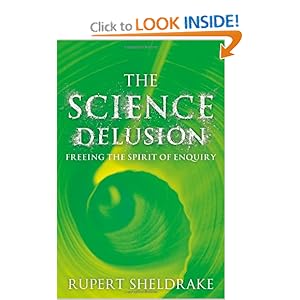As I asked here, how do we decide what is “woo” or why someone should be attacked for peddling it? Sheldrake is an animal behaviourist who has for some time attracted hostility for researching the ability of intelligent animals to know things in ways that are against the rules we have made for them.
Here is a story that might point us in a direction more fruitful than listening to the self-satisfied rants of the guardians of “science”:
From a recent New York Times story,
Nobody knows how it happened: an indoor house cat who got lost on a family excursion managing, after two months and about 200 miles, to return to her hometown.
Even scientists are baffled by how Holly, a 4-year-old tortoiseshell who in early November became separated from Jacob and Bonnie Richter at an R.V. rally in Daytona Beach, Fla., appeared on New Year’s Eve — staggering, weak and emaciated — in a backyard about a mile from the Richters’ house in West Palm Beach.

Not so fast. Reporter Pam Belluck references a 1954 German study in which
cats placed in a covered circular maze with exits every 15 degrees most often exited in the direction of their homes, but more reliably if their homes were less than five kilometers away.
Such studies don’t tend to get followed up, so heart-warming anecdotes are our sole, steamy window into the facts.
I suspect one reason such studies are not followed up is this: Career academics can get by, by pointing out that there is no known mechanism by which a cat can accomplish such a feat. Indeed one expert Belluck consulted said,
… nobody’s going to do an experiment and take a bunch of cats in different directions and see which ones get home.
No? That is exactly what the maze experiment Belluck reported did (except that the cats were quite safe, of course).
The cats only needed enough intelligence to know which maze door is the right exit if they want to start off home. The critical question is, what is the source of information, given that the cat is a territorial but non-migratory animal?
In any event, people reporting a returned cat incident are told that they have grafted their emotions onto a cat who looks like the lost one. This will seem unconvincing if the cat not only looks the same but behaves the same, and appears to recognize the same people. But perhaps, they must consider, they were just imagining and confabulating all that too.
There was one key difference in Holly’s case: An animal rescue organization discovered that Holly had an ID microchip implanted in her ear. It was the same cat.
As to how a cat might navigate, hypotheses vary in the absence of research. One clue is that Holly lives along the Florida coastline, and could have kept the ocean on her right and I-95 on her left. She had lost half her body weight and had worn, bleeding paws, implying that she walked all or most of the way.

We have much to learn about animal cognition, but advances may require challenging current beliefs about how animals know things, learn, or navigate. This may be a good time to hat tip the work of Rupert Sheldrake on animal senses. Sheldrake, who was ostracized for doubting Darwin and subsequently much ridiculed (he once had to throw celebrity Richard Dawkins out of his lab for trying to do a hit piece on him), has done careful, interesting work on dogs who have an uncanny ability to know when their masters are returning home.
Dog owners often ascribe their animals’ anticipations to telepathy or a “sixth sense”, but as Sheldrake notes, there could be more conventional explanations:
First, the dog could be hearing or smelling its owner approaching.
Second, the dog could be reacting to routine times of return.
Third, it could be responding to subtle cues from people at home who know when the absent person is returning.
Fourth, the animal may go to the place at which it waits for its owner when the person is not on the way home; the people at home may remember its apparent anticipation only when the person returns shortly afterwards, forgetting the other occasions. Thus the phenomenon could simply be an artifact of selective memory.
In order to test these possibilities, the dog should be capable of reacting at least ten minutes in advance, the person to whom the dog responds should come home at non-routine times, the people at home should not know when this person is coming, and the behavior of the dog should be recorded in such a way that selective memory can be ruled out (Sheldrake, 1994). This recording of the dog’s behavior can be done most effectively by means of time-coded videotape.
In this paper we describe a series of videotaped experiments and observations with a dog called Jaytee, belonging to Pamela Smart (PS). More.
Jaytee, and some other subsequently tested dogs, did seem to know, but read and judge for yourself. Of course Sheldrake might be mistaken, but the last people we should want to hear from in judging the matter are (former) fellow Darwinians, Wikipedian trolls, and anyone else with a vested interest in attacking him.
This post is slightly edited from a version that originally ran at The Best Schools January 23, 2013.